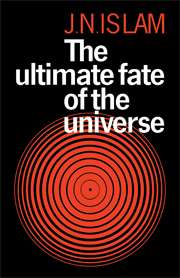Book contents
- Frontmatter
- Contents
- Preface
- Dedication
- Note on some conventions
- 1 Introduction
- 2 Our Galaxy
- 3 The large-scale structure of the universe
- 4 Elementary particles – a preliminary look
- 5 Is the universe open or closed?
- 6 Three ways for a star to die
- 7 Black holes and quasars
- 8 Galactic and supergalactic black holes
- 9 A black hole is not forever
- 10 Slow and subtle changes
- 11 Future of life and civilization
- 12 A collapsing universe
- 13 The steady state theory
- 14 The stability of the proton
- 15 Epilogue
- Glossary
- Selected bibliography
- Index
14 - The stability of the proton
Published online by Cambridge University Press: 06 July 2010
- Frontmatter
- Contents
- Preface
- Dedication
- Note on some conventions
- 1 Introduction
- 2 Our Galaxy
- 3 The large-scale structure of the universe
- 4 Elementary particles – a preliminary look
- 5 Is the universe open or closed?
- 6 Three ways for a star to die
- 7 Black holes and quasars
- 8 Galactic and supergalactic black holes
- 9 A black hole is not forever
- 10 Slow and subtle changes
- 11 Future of life and civilization
- 12 A collapsing universe
- 13 The steady state theory
- 14 The stability of the proton
- 15 Epilogue
- Glossary
- Selected bibliography
- Index
Summary
In this chapter I shall consider one of the most important questions concerned with the long-term future of the universe and, indeed, one of the most important questions in physics. The question is whether or not the proton is stable. Until recently it had been assumed by physicists that the proton was indeed stable, that is, a proton left to itself would last forever. Recently, however, some theories of elementary particles have been put forward which imply that the proton is unstable, with a very long lifetime. In this chapter we shall try to see in what way these theories arise, and what are the consequences of proton decay. Before we can understand where the new theories fit, we shall have to know something about the theory of elementary particles, in much more detail than we considered in Chapter 4. To remind the reader I may repeat some of the points made earlier.
Every since the time of the ancient Greeks, people have wondered what is the ultimate nature of matter. They have wondered about the ultimate constituents of matter and about the manner in which these constituents affect each other or interact with one another. The Greek physical philosopher Democritus, who was born in the fifth century bc, speculated that all matter was made of atoms, which were eternal, indivisible and invisible. In the past hundred years or so and particularly in the last three or four decades a tremendous effort has gone into the investigation of this problem.
- Type
- Chapter
- Information
- The Ultimate Fate of the Universe , pp. 118 - 133Publisher: Cambridge University PressPrint publication year: 1983



